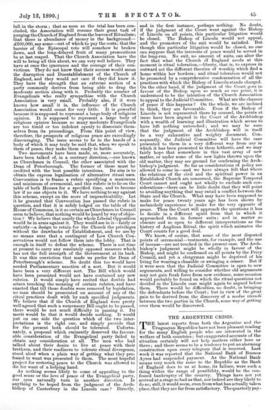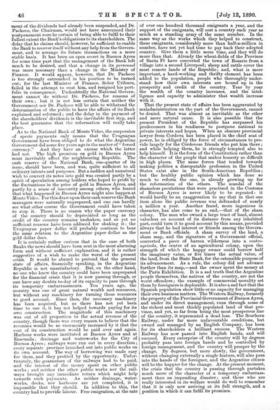THE ARGENTINE CRISIS.
THE latest reports from both the Argentine and the Uruguayan Republics have not been pleasant reading- for the many English people who are interested in the- welfare of both countries ; but exaggerated accounts of the- situation certainly will not help matters either here or there ; and there seems to be a tendency to put an alarming- construction upon every telegram that is received. Last week it was reported that the National Bank of Buenos Ayres had suspended payment. As the National Bank means very much the same to the Republic as the Bank- of England does to us at home, its failure, were such a. thing within the range of possibility, would be the con- fessed bankruptcy of the country. Things have not yet arrived at a stage so bad as that, nor indeed are they likely to- do so: still, it would seem, even from what has actually taken anent of the dividends had already been suspended, and Dr. Pacheco, the Chairman, would not have announced their -postponement were he certain of being able to fulfil to their 'fullest extent the Bank's obligations to its shareholders. The delay that he claims should, however, be sufficient to enable the Bank to recover itself without any help from the Govern- ment, and to arrange its future transactions on a more stable basis. It has been an open secret in Buenos Ayres for some time past that the management of the Bank left much to be desired, and that a change in its personnel was more necessary than a change in the Ministry of Finance. It would appear, however, that Dr. Pacheco is too strongly entrenched in his position to be turned out; for the last Minister of Finance, Sefior 17riburu, failed in the attempt to oust him, and resigned his port- folio in consequence. Undoubtedly the National Govern- ment cannot do without Dr. Pacheco, for reasons of their own ; but it is not less certain that neither the Government nor Dr. Pacheco will be able to withstand the determination of the public to have the affairs of its Bank 'explained and reformed ; and the delay in the payment of the shareholders' dividends is the inevitable first step, and the best guarantee that the reformation will really take place.
As to the National Bank of Monte Video, the suspension of specie payments only means that the Uruguayan Government have been obliged to do what the Argentine Government did some five years ago in the matter of" forced currency." And they have an excuse which the latter had not. The high premium on gold in Buenos Ayres must inevitably affect the neighbouring Republic. The cash reserve of the National Bank, one-quarter of its issue, should have been, and was, quite sufficient to all ordinary intents and purposes. But a sudden and unnatural wish to convert its notes into gold was created partly by a spirit of speculation among holders who hoped to profit by the fluctuations in the price of gold in Buenos Ayres, and partly by a sense of insecurity among others, who feared that what happened in Buenos Ayres might also happen at Monte Video. For this draw upon their cash reserve the Bank managers were naturally unprepared, and one can hardly see what other course the Government could have taken to stop it. There is no reason why the paper currency of the country should be depreciated as long as the credit of the country remains unshaken, and as yet no sufficient reasons have been adduced for shaking it : the -Uruguayan paper dollar will probably continue to bear -the same relation to the Argentine paper dollar as the gold dollar does. It is certainly rather curious that in the case of both Banks the news should have been sent in the most alarming form and without sufficient explanation, and it is rather suggestive of a wish to make the worst of the present crisis. It would be absurd to pretend that the general -state of affairs, financially speaking, in the Argentine Republic is not unsatisfactory. But, on the other hand, no one who knew the country could have been unprepared for the financial crisis that it is now passing through, or can have any doubts to-day of its capacity to pass through its temporary embarrassments. Ten years ago, the country was one of great natural wealth and resources, but without any machinery for turning those resources -to good account. Since then, the necessary machinery has been acquired, but as there has not yet been time to use it, it has not helped towards paying for its own construction. The magnitude of this machinery was out of all proportion to the actual revenue of the country, though there was every reason to believe that the revenues would be so enormously increased by it that the cost of its construction would be paid over and again. Harbour works were instituted at Buenos Ayres and at Ensenada ; drainage and waterworks for the City of Buenos Ayres ; railways were run out in every direction ; every separate province launched out into public works on its own account. The way of borrowing was made easy for them, and they profited by the opportunity. Unfor- tunately, the guarantees of the railways had to be paid, and the interest of the money spent on other public works ; and neither the other public works nor the rail- ways brought any immediate return which might help towards such payments. As neither drainage, water- works, docks, nor harbours are yet completed, it is impossible that they should. In addition to this, the country had to provide labour. Free emigration, at the rate of over one hundred thousand emigrants a year, and the support of the emigrants, will cost a country each year as much as a standing army of the same number. In the same way as the works which they helped to construct, these emigrants, considerably more than half-a-million in number, have not yet had time to pay back their adopted country. Give them a little more time, and they will do more than that. Already the wheat-fields of the Province of Santa Fe have converted the town of Rosario from a village into a second Liverpool; sheep and cattle cover the most remote lands of the Republic ; and, what is more important, a hard-working and thrifty element has been added to the population, people who thoroughly under- stand how their own interests are bound up in the prosperity and credit of the country. Year by year the wealth of the country increases, and the intel- ligence and capacity to administer that wealth increase with it.
That the present state of affairs has been aggravated by maladministration on the part of the Government, cannot be denied. That was almost as inevitable as the other and more natural cause. It is also possible that the present President of the Republic has surpassed his predecessors in his readiness to postpone national to private interests and hopes. When an obscure provincial lawyer from Cordova has been placed in the chief seat of power, he is obliged by the force of circumstances to pro- vide largely for the Cordovese friends who put him there ; and while helping them, he is strongly tempted also to help himself. It is the form of the Constitution rather than the character of the people that makes honesty so difficult in high places. The same forces that tended towards making politics a disreputable profession in the United States exist also in the South-American Republics ; but the healthy public opinion which has done so much to reform the one, is already growing up for the reformation of the others. The scandal of the shameless peculations that were practised in the Customs of Buenos Ayres is never likely to be repeated : it would hardly be an exaggeration to say that in that one item alone the public revenue was defrauded of nearly a million a year. Another fraud, more ingenious in character, has also come to an end,—that of the sham colony. The man who owned a large tract of land, almost valueless on account of its distance from any inhabited part, could turn it to good account by this means, provided always that he had interest or friends among the Govern- ment or Bank officials. A sham survey of the land, a sham map, and the signature of a Government official, converted a piece of barren wilderness into a centro- agricola, the centre of an agricultural colony, upon the strength of which the happy owner could borrow half the imaginary value, or five times the actual value, of the land, from the State Bank, for the ostensible purpose of its advancement. As a rule, the colony did not advance further than its map,—and the owner spent the money at the Paris Exhibition. It is a sad truth that the Argentine people themselves, the natives of the country, are not the worst offenders ; the example of commercial morality set them by foreigners is deplorable. It is also a sad fact that the Spanish population show little or no capacity for managing their own business matters. The Western Railway, formerly the property of the Provincial Government of Buenos Ayres, and under its direct management, runs through some of the richest and most thickly populated land of that pro- vince, and yet, so far from being the most prosperous line of the country, it represented a dead loss. The Southern Railway, under far more unfavourable conditions, but owned and managed by an English Company, has been for its shareholders a brilliant success. The Western Railway has now passed into English hands, and will succeed. Every enterprise of the country will by degrees probably pass into foreign hands and be controlled by foreign management, and the country will prosper by the change. By degrees, but more slowly, the government, without changing externally a single feature, will also pass into the hands of the foreigner, and the Argentine citizen will be the happier for the change. At the present moment, the crisis that the country is passing through partakes much more of the character of a temporary embarrass- ment than an impending disaster ; and those who are really interested in its welfare would do well to remember that it is only now arriving at its full strength, and a position in which it can fulfil its promises.



































 Previous page
Previous page